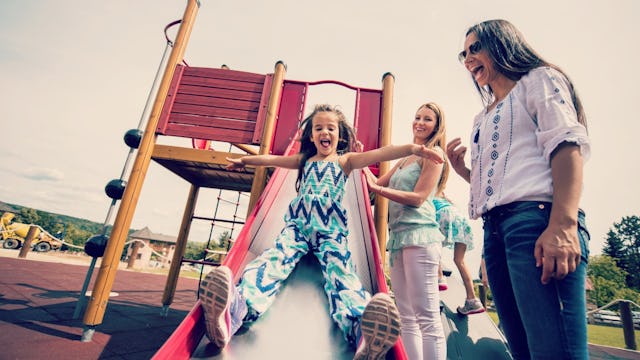Parents, Please Don't Talk Sh*t About Other Children

I grew up in the ’80s. It was a decade of trends that were fully immersed in bold colors, big eyebrows, even bigger shoulder pads, and a decidedly neglectful parenting style. This was the golden age of the latchkey kid and sloppy joes.
Not surprisingly, parents didn’t get overly involved in their kids relationships. I remember very distinctly coming home in the sixth grade in tears. I sat down to a bowl of Campbell’s tomato soup and buttered Premium salted crackers with a note from my friends. “We are kicking you out of the group,” signed by, of course, The Group. (This was the ’80s version of being popular or squad goals, all equally meant to segregate.)
I showed my mom the tear-stained paper and went all sorts of hormonal when she very simply told me that I would be okay and to hurry up and finish lunch before it got cold. There wasn’t a solution presented to me, a phone call to The Group’s parents, or an intervention of any kind. The world can be difficult, and this too shall pass was all wrapped into that one quick sentence and soupy nourishment. Or she simply didn’t want to deal with adolescent girl shit, and who could blame her? It was a difficult lesson, and one that would be repeated through the rest of my school career, and where women are concerned, through adulthood as well.
These days, a note from The Group is being replaced by something far more disturbing than cliquey girls, and I’m not solely talking about the helicopter that parents are flying low on the playground. It seems that many adults are orchestrating the drama themselves. We see and hear it all the time, and if I’m being honest, I have engaged myself. When you’re a parent participating in a conversation that could potentially harm a child’s reputation, and which hijacks their privacy, it’s probably time to take a good, solid look in the mirror and ask yourself if that is the kind of community you want to build and behavior you want to model for your own children.
“See that boy there? He got in a fistfight at school the other day. I heard he’s a real loner, not a lot of friends. I wonder what’s really wrong with him.”
“My friend told me that her friend’s daughter over there…”
“Something is not quite right about that one. She’s always looking for attention!”
“That kid’s mom is a total nut. I’d be willing to bet she’s just like her!”
In a world where we post some of our children’s most private moments on social media, leaving a footprint they didn’t ask for (guilty as charged!), is it any surprise that parental involvement would come to this? We make assessments based on small glimpses into their lives and hold insignificant actions and moments against them. I don’t think these adults understand the damage they are doing to children when they delight in gossip about these tiny humans.
The parental grandstanding, disguising their whispers as concern, is just plain sad. Are they living vicariously through their mini me, and are the waves they are creating meant to showcase the talents of their offspring, elevating the status of their child and their own parenting skills?
I am trying more and more to parent like those of the neon area. Respectful and aware, but trusting that my daughters have been given the tools to mitigate the suffering of a situation. I reserve the right to intervene in order to try to understand the current state of affairs affecting them; that is in the parental contract.
I will, however, seek deliverance from the playground parent just itching to make shit up that could potentially violate my relationship with my daughters and their peers. We are the adults; these are the children. It’s time to dial it back and remember that.
Oh, and let’s transfer these skills to our own friendships too.
This article was originally published on